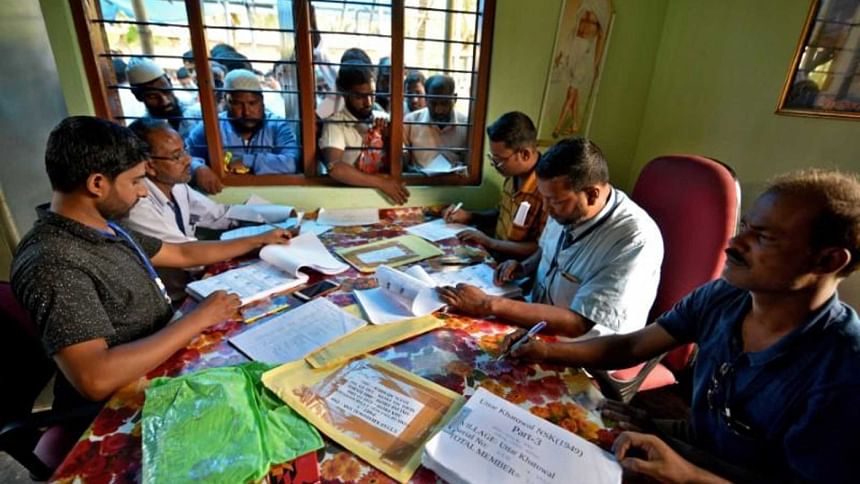Two years on, NRC’s bumpy road ahead

On August 31, 2019, the "final" draft of the National Register of Citizens (NRC) in Assam was published amidst considerable expectations, excitement and anxiety. It was a document of "genuine" Indian citizens that was thought to be the panacea for the state's long-festering issue of illegal immigrants.
The NRC is a document of Indian citizens who can prove they came to Assam by March 24, 1971, the day before Bangladesh declared independence from Pakistan. Assam is not the only Indian state which has faced migration of people from across the border, and yet, it is the first and only state which has a NRC which was published for the first time in 1951 based on the first census data of independent India.
When the first draft NRC was released on July 30, 2018, more than four million people found themselves out of the list. An additional 102,462 people were left out in June that year, taking the total number of those excluded to 4,110,169. However, the number came down to a little over 1.9 million in the final NRC. But two years down the line, nothing has changed. Those who were left out of the NRC as well as nearly eight lakh people who were lucky to have made it on to the document continue to stare at a bleak and uncertain future. Equally concerned are thousands of people who, having been suspected of being foreigners, have been put in make-shift camps located in the state's prisons.
The "final" NRC ran into a tsunami of controversy the moment it was published as it came under fire from almost all quarters in Assam as a "flawed" exercise carried out by the bureaucracy. The Supreme Court, which supervised the NRC preparation process from 2013, has not heard the matter since January 6, 2020. Both the BJP government at the Centre and the state coordinator of NRC have not accepted it either and are seeking for a reverification of 20 percent of the names which figured in the final NRC.
Does it mean that 1.9 million people who are out of the final NRC have become stateless? Not quite. Those excluded from the list can appeal to the special tribunals as well as the Supreme Court. But they face a few key challenges: for one, the burden of proof is on the accused or the alleged foreigner. Secondly, many families are unable to produce documents due to poor documentation culture, illiteracy or because of lack of funds to hire lawyers to move the tribunal.
It was made clear that those left out of the final NRC would not be declared foreigners and they would have the choice of appealing against their exclusion from the NRC within 120 days in foreigners' tribunals which was to decide on their citizenship status based on the provisions of the Foreigners Act, 1946, and Foreigner (Tribunals) Order, 1964. However, those excluded have not been issued "rejection slips" by the NRC office, which would help them to file appeals. All India United Democratic Front legislator Ashraful Hussain, who was actively involved in helping Muslims of East Bengal (now Bangladesh) to file their documents for moving the foreigners tribunals, has called for immediate issuance of the "rejection slips." Adding to the predicament of those left out of the NRC, the Registrar General of India is yet to formally notify the final NRC as several applications seeking re-verification of the list are pending in the Supreme Court.
The Supreme Court mandated that eight lakh people who made it to the NRC give their biometrics so that they can avail of the federal and the state government's social welfare schemes and secure jobs by getting multipurpose Aadhaar Unique Identification Card. But many of them continue to struggle to get the card even today because of a "freeze" on the release of biometric details and therefore the Aadhar cards, adding to their trauma of finding themselves in a "so-near-yet-so-far" situation. The trauma for the people excluded from NRC is mounting with each passing day as they wait for the exercise to resume.
Aadhar card is not only required for buying ration and enjoying the benefits of the government's schemes The collection of biometrics of those excluded from the NRC following a Supreme Court-approved standard operating procedure in November 2018, is needed during the hearing of their claims for inclusion in the NRC and objections to the inclusion of people who may have figured in the citizens' list erroneously or through alleged manipulation. Officials at the Aadhar card issuing office in Guwahati reportedly told The Indian Express that they cannot issue the Aadhaar cards "till a clarification is received from RGI and the matter is communicated to UIDAI by Home and Political Department, Government of Assam."
Apart from triggering political turmoil, the final NRC released on August 31, 2019 has thrown up more problems as the entire exercise conducted by the Assam bureaucracy at a cost of Rs 1,660 crore got mired not only in controversies over the exclusion of people belonging to both the Hindu and Muslim communities, but also due to legal complications and the absence intervention by the Supreme Court which had monitored the updating of the list of citizens.
Making the NRC largely acceptable to all stakeholders is indeed a daunting task in a state where ethnic and linguistic faultlines between "original inhabitants" and migrants have always simmered. The road ahead is far from clear. At a more fundamental level, the question is: how bumpy is the road going to be?
Pallab Bhattacharya is a special correspondent for The Daily Star. He writes from New Delhi, India.

 For all latest news, follow The Daily Star's Google News channel.
For all latest news, follow The Daily Star's Google News channel. 



Comments